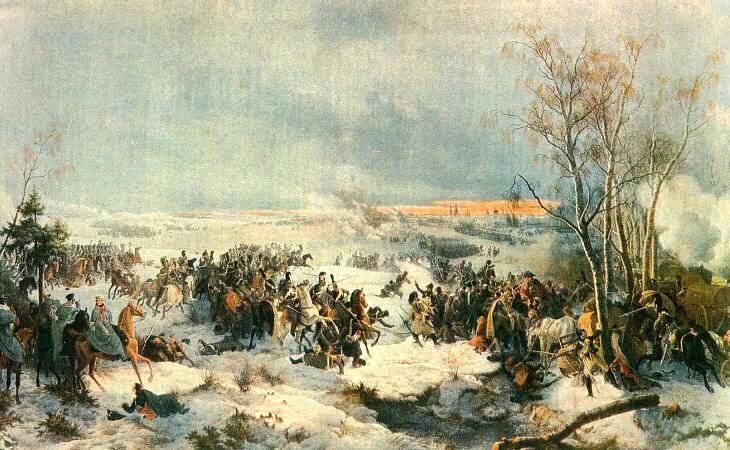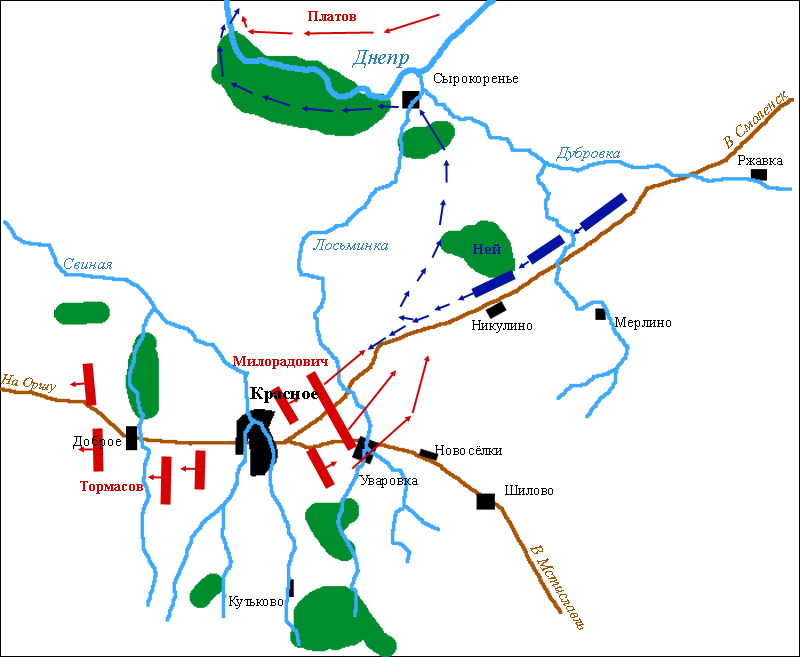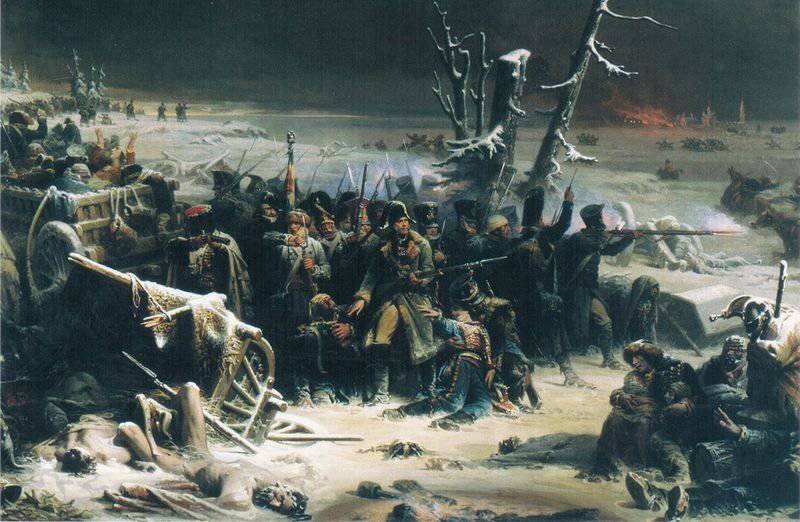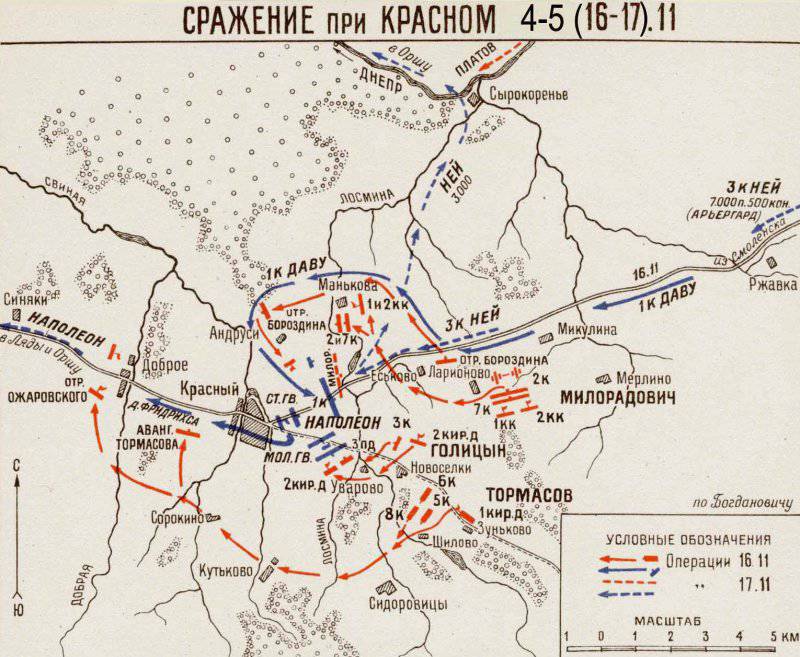Battle of Red 3 – 6 (15 – 18) November 1812

Peter von Hess (1792-1871). Battle of the Red.
The French army, arriving in Smolensk, considered itself in relative safety. Napoleon even wanted to keep the Russian troops on this line. Relying on Smolensk, he planned to withdraw the remaining troops to winter apartments between Mogilyov, Orsha and Vitebsk. Therefore, the corps of Udino and Viktor received orders to throw the Russians off to the Western Dvina.
The day after arriving in the city - October 29, Napoleon inspected the area, and then began to work on the reorganization and strengthening of the upset troops. The infantry received the missing armament from the stockpiles (many were abandoned during the retreat weapon) and full ammunition ammunition (for 50 ammunition for a soldier). The remaining artillery also tried to put in order. The situation was worse with the cavalry, there was a strong shortage of horses. Napoleon gave the order to urgently transfer the horses from the troops of the second line. An order to increase reserves was sent to Orsha.
A significant part of Napoleon’s army still maintained its combat capability, and Napoleon did not give up hope, with a favorable state of affairs, successfully completing the retreat. In a pinch, he was going to go to the West. The number of Napoleon's army was about 70-80 thousand people, of which about 50-thousand. retained combat capability.
However, a few days later came the news that violated these plans. The 4 Army Corps of Eugene Beauharnais on October 28-29 was defeated on the Vop River by the Cossacks of Platov, suffered significant losses, lost most of the artillery and the wagon train. Beauharnais, after the defeat, hastily retreated to Smolensk. Almost simultaneously, there was a message about the defeat and surrender of the Augere brigade near the village of Lyakhovo and the hasty retreat of the Barage de Illier division to Smolensk. This cleared the army of Kutuzov on Yelnya, and the Russian troops could reach the Red before the French, repeating the situation in Vyazma. Then it became aware of the loss of Vitebsk with its warehouses and the failures of the north-flank corps in the fight against Wittgenstein. The army of Wittgenstein was at a distance of four days from Borisov.
Napoleon was very annoyed, the loss of his position in Orsha, Vitebsk, the departure of the Udino and Viktor corps forced him to retreat further. It is possible that the Russians will come out on the flanks of the main army and cut off the main communication. 2 (14) November, the French army moved west again. The withdrawal was again continued in one column and the troops were greatly stretched. At the forefront was the 5 corps of Joseph Zayoncek (he replaced the sick Ponyatovsky), followed by Junot, the Guard and the rest of the troops. 8 Corps of Ney remained in the rearguard, who entered the ravaged Smolensk after the withdrawal of other troops. Contrary to the orders of Napoleon, Ney was forced to stay in the city in order to somehow restore order in the troops, to replenish stocks of provisions and ammunition.
By the evening of November 3 (15), the Guard, Junot corps and Murat's cavalry reached the Red. But it turned out that the city was already captured by the Russians. Ozharovsky's detachment captured the French garrison stationed in Red. In addition, there were Cossacks who disturbed the French troops with their raids. Kolenkur wrote: "It is easy to imagine what kind of anxiety spread, and how this affected the morale of the army." Napoleon ordered the Russians out of the city and stopped, waiting for the approach of other troops.
The actions of the army of Kutuzov
While Napoleon sat in Smolensk and considered his actions, Kutuzov’s headquarters was actively preparing his strike. At Kutuzov’s headquarters, they feared that Napoleon would divide his troops and would retreat from Smolensk in several directions. This will allow him to speed up the movement and connect with the Udino and Victor corps. In this case, there would be a threat to the army of Wittgenstein. In addition, there was the possibility that Napoleon could head south of Smolensk and create a new operating line to Roslavl, Rogachev and further through Slutsk to Nesvizh to connect with Renier and Schwarzenberg corps.
To observe the actions of the enemy, the commander-in-chief advanced the 4 th infantry and 4 th cavalry corps forward, south of Smolensk. At this time, the main forces of the army crossed from Roslavl to Mstislavskaya road and began to move to Yurovo. Having received a message from Miloradovich, who commanded the vanguard that the enemy was moving along the road to Orsha, Kutuzov considered that part of Napoleon’s army had passed Red. This created a threat to Wittgenstein’s troops. In addition, the news came from Chichagov, that his army went to Minsk. It changed the situation. Napoleon could no longer retreat southward. Therefore, Kutuzov gave Miloradovich an order to increase pressure on the enemy in order to inflict a new defeat on him. He ordered to cut off and defeat part of the French army from Red. To the aid of Miloradovich were sent two cuirassier divisions under the command of Golitsyn. In addition, Miloradovich and Golitsyn were to establish contact and act together with the partisans and the Ozharovsky detachment.
To fully clarify the situation, Kutuzov ordered the detachments of Ozharovsky and Davydov to conduct reconnaissance by force. Ozharovsky's detachment was strengthened by cavalry, it included two Poltava Cossack regiments, two Don Cossack regiments, the Mariupol Hussars, the 19 th Jäger Regiment and the 6 horse artillery guns. October 28 (November 9) Ozharovsky’s detachment attacked and defeated the French in the village of Khmara. 2 (14) November Ozharovsky with the battle took the Red and captured the local garrison.
Battle
3 (15) November. The division of General M. Klapareda knocked out of the Red "flying" detachment Ozharovsky. Russian detachment retreated to Kutkovo. At 4 one o'clock in the afternoon, the vanguard of Miloradovich (2, 7, infantry, 1, cavalry corps, about 18 thousand people with 100 guns), received an order to cut off part of Napoleon’s sprawling forces from Red, approached the Smolensk road in the Ravka area and deployed his troops along the road. At that moment, the guards units of Napoleon’s army were moving along it. Miloradovich did not dare to attack the enemy, most of the Imperial Guard passed by (12-13 thousand). He hit the closing columns and, after a stubborn fight, scattered them. 2 of thousands of prisoners and 11 guns were captured. Then the guard was attacked by the Orlov-Denisov partisan detachment, but without any casualties for the French. Napoleon entered Red and waited for the rest of the troops.
Napoleon, having received the news that a separate Russian detachment was located not far from Red, ordered the Young Guard to destroy it. On the night from 3 to 4 in November, a division under the command of General F. Horn attacked the Ozharovsky unit and forced him to retreat. The absence of cavalry did not allow the Horn to build on success.
4 (16) November. In the second half of the day, the 4 corps of Beauharnais approached the position of Miloradovich, who moved to Merlino. The commander of the 4 Infantry Division, Yevgeny of Württemberg, advanced artillery to the road and began shelling the enemy’s advanced columns. Soon he was supported by the 12-I and 26-I divisions of the 7-Corps. The head column of the enemy corps was dispersed.
The first step to defeat the enemy was made. However, Miloradovich arrived at the battlefield, took all three divisions off the path and arranged them parallel to the road, leaving only two infantry regiments to cover the artillery. When the rest of the troops of the Italian Viceroy approached the battlefield, Miloradovich suggested they capitulate. Yevgeny Beauharnais decided to break through He threw on the remnants of the remnant of the 14 th Infantry Division Brousse. However, it was also scattered by artillery fire. Following Beauharnais, Ornano’s 13 Division was thrown into battle, but the Russian cavalry surrounded her and forced her to lay down arms (Ornano was seriously wounded, he was considered dead and left, at night his adjutant brought Ornano to the location of his troops). Following the 13 Division, the 15 Division and other units were thrown into battle. Beauharnais built the remaining troops in three columns. The left column was cut off and surrendered, the average dispersed by artillery fire, only part of the right was able to break into Red. As a result, the 4 Army Corps of the Italian Viceroy, already defeated by the Cossacks of Platov, was finally defeated. In this battle, the corps of the viceroy lost 2 thousand people only prisoners from their 6 thousand, as well as the remaining guns and train.
The news of the defeat of Beauharnais, forced Napoleon to return the guards to Red to save the corps of Davout and Ney. Only parts of Junot and Poniatovsky continued to move to Orsha.
On the same day, the main forces of Kutuzov reached the Red, they concentrated in 5 km east of the city. The success of Miloradovich gave decisiveness to the Russian generals, they insisted on a general offensive. Kutuzov agreed with them. According to the plan of the commander-in-chief, a double blow was envisaged. Home column Tormasov: 5-th, 6-th, 8-th infantry corps, 1-Cuirassier Division, the vanguard of Rosen and detachment Ozharovsky (. 22-23 thousand bayonets and sabers at 120 guns) in the morning 5 (17) in November should was to bypass the city from the south, and through Sidorovichi and Sorokino, go to the village of Dobroye (3 km west of Red) and block the enemy's way to the west. The auxiliary convoy of Golitsyn: the 3 Infantry Corps, the 2th Cuirassier Division and the Chernigov Regiment (about 15 thousand), had to come out a little later than the Tormasov column and go to the village of Uvarovo to strike the enemy from the southeast. In addition, the vanguard of Miloradovich - 2 infantry and 2 cavalry corps, was supposed to attack the enemy from the east.
5 (17) November. Kutuzov’s plan for a simultaneous strike against the forces of the enemy was not realized. When the columns of Tormasov and Golitsyn were in the process of movement, the head column of the Davout 1 Corps (7,5 thousand people with 15 guns) appeared on the Smolensk road. Davu withdrew from the camp located near Rzhavka, around 3 in the morning hours, because he received news of the defeat of Godfruit. According to the original plan, he had to wait for Ney.
Russian troops holding the road under control, fired at Davout's troops, but did not attack. Miloradovich had the order of Kutuzov to miss the enemy. The French wanted to clamp between Golitsyn and Miloradovich. As a result, Davout’s corps, albeit with losses, went to Red.
At this time, Napoleon heard artillery firing, decided to support Davout and strike at Kutuzov's troops. Early in the morning, the 11 of thousands of Imperial Guard soldiers advanced from the Red in the south and south-west. The guard was divided into two columns: 5 thousand went along the road to Smolensk, the remaining 6 thousand. Young Guard under the beginning of the Horn moved to Uvarovo. Napoleon supported the troops by personal presence.
The appearance of Napoleon’s guard at Uvarovo came as a surprise to the Russian command. Kutuzov assumed that the Guard, the corps of Ponyatovsky and Junot left Red and he would have to deal only with the corps of the viceroy, Davout and Ney. The French Guard beat out Golitsyn's forces from Uvarovo (there were only two battalions standing there). Golitsyn opened fierce artillery fire on the village, which caused great damage to the Young Guard. Further French attacks were unsuccessful.
Napoleon did not plan to wage a decisive battle under Krasny, therefore, as far as the unit approached, parts of Davout were heading for Orsha. At about 11 hours of the day, when most of Davout’s corps was behind Red, Napoleon received news that considerable Russian forces were coming out to Good. In addition, Golitsyn activated his actions. This information, combined with data on the considerable losses of the Young Guard (it lost half of its membership), forced Napoleon to decide on an immediate retreat, in fact sacrificed Nei's corps. The Old Guard and the remnants of the corps of Beauharnais were the first to advance on Lyady and Orsha. The command of the troops in Red was left Davout. The Young Guard was supposed to stay temporarily near Uvarov, but soon she began to retreat.
Tormasov did not have time to intercept the French troops, because when the French Guards attacked Uvarovo, he received an order to strengthen Golitsyn. When it became clear that the French were retreating, Tormasov again received an order to go to the Good, but it was too late. True, the units of Rosen and Ozharovsky were able to deliver a strong blow to the rearguard of the Davout corps, effectively destroying it.
At nightfall, Kutuzov stationed an army in and around Krasnoye, blocking the way for Nei's corps.
6 (18) November. Defeat the corps of Ney. Ney had under his command 8,5 thousands of people with 12 guns and 7-8 thousands of practically incapacitated soldiers who marched behind his column. Break through the army of Kutuzov in the Red and then he had no chance. Nei lingered heavily in Smolensk and made only 2 o'clock in the morning 5 (17) in November. Leaving the city, the marshal on the orders of the French emperor blew up the Royal Gates, 8 godunovskih towers and almost all large buildings. Leaving Smolensk, the marshal was forced to abandon his guns with 140, 17 of captured Russians and most of the convoy. In addition, 4 left thousands of injured in the hospitals.
In the evening of November 5, Ney came out to Korytna, having heard the cannonade at Red, he considered that Victor's body was breaking through to Napoleon and did not attach much importance to it. At dawn 6 November, he continued to move. The appearance of the Russians at the crossing of the Losmin River was unexpected for him. On the river, 2 and 7 infantry corps occupied positions that advanced artillery. On the left flank was the cuirassier division, on the right - the 2 Cavalry Corps.

Battle of the Red. The position of the troops on 6 (18) November.
Ney believed that Napoleon's troops were stationed in Red, and he only needed to break through the Russian order. Miloradovich suggested that Nea capitulate. However, the marshal decided to go for a breakthrough and detained an envoy so that he would not inform the Russian command of the difficult condition of the corps. Nei ordered the 11 Division to attack the Russian position in order to break into the city. Under cover of mist and fire 6 guns the French went on the attack. Soon, however, the Russian artillery suppressed the French battery, and stopped infantry with a shotgun fire. Then the troops of the 12 th and 26 th infantry divisions, two regiments of the 1 th grenadier division, supported by cavalry, went to the counterattack and overthrew the enemy.
Ney sent the remnants of the division Razu to Syropolena, where he planned to cross the Dnieper. And Ledru’s 10-Division approached was thrown into battle. Under the cover of battle, he managed to pull off the remaining troops and carts, but the situation was already catastrophic. Ledru's division was crushed and capitulated. Ney abandoned the forces that had lost their combat capability and the forest trails with the 3 ths. Detachment began to make their way to the Dnieper. Its main forces - 12 thou. People capitulated.
Ney with his detachment went to the north, crossed the Losminka near the village of Syrokorenie. Then, across the thin ice, crossed the Dnieper, losing a lot of people who drowned in the polynyas. Pursued by the Cossacks of Platov, he arrived on November 20 before the location of Napoleon in Orsha. With him, there was only 800 — 900 man, the corps of Ney ceased to exist.

The soldiers of Marshal Ney were driven into the forest.
After the battle, the flagship with which the French regiments were awarded for Austerlitz were brought to the commander’s headquarters. The commander of the Moscow militia Posnikov shouted: “Hurray for the savior of Russia!”, And a loud “Hurray!” Swept through the whole army. It was a touching moment. Suddenly, Kutuzov got up and shouted: "Come on, friends, completeness!" What do you! This honor is not for me, but for the Russian soldier! ”The great commander was very modest.
Results
- In the four-day battle of Red, the French emperor suffered the first complete defeat in his life and actually fled the battlefield, leaving his troops. The French army lost 10-13 thousand people killed and wounded, 20-26 thousand people captured, about 200 guns (Clausewitz reports 230 guns), almost all transports. In fact, Napoleon was left without cavalry and artillery. The corps of Beauharnais and Ney were defeated, the corps of Davout suffered heavy losses. This defeat put the remnants of Napoleon’s army to the brink of disaster. Fully demoralized French units retreated to the Berezina. Plans to stay for the winter in the area of Mogilev, Orsha, Vitebsk and Polotsk finally collapsed.
- The losses of the Russian army were insignificant - 2 thousand people. - For the battle of Red, Mikhail Kutuzov received the title of Prince of Smolensk.
- Some Russian generals, in particular Bennigsen, believed that Kutuzov inflated the significance of the victory under Red and missed the possibility of a complete defeat of the French army. According to them, because of the indecision of the commander in chief, Napoleon was able to withdraw a significant part of the troops.

Information